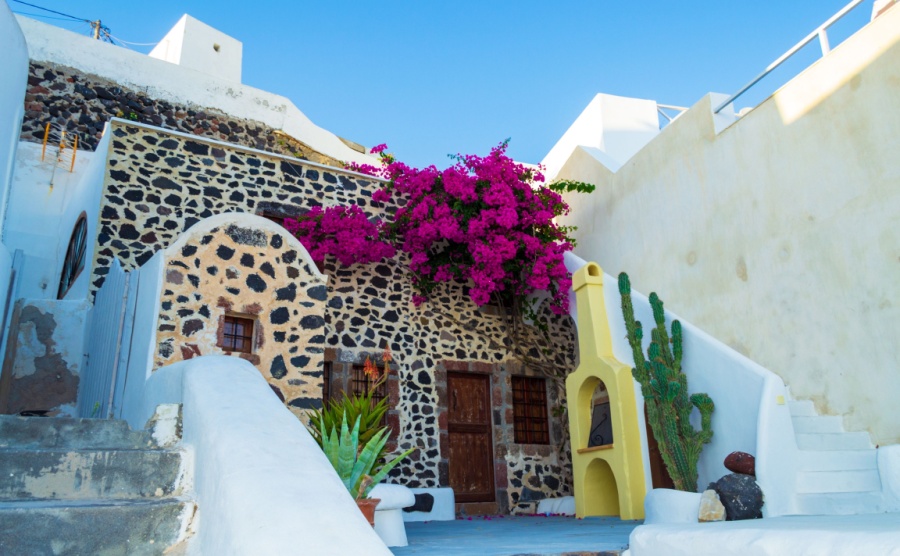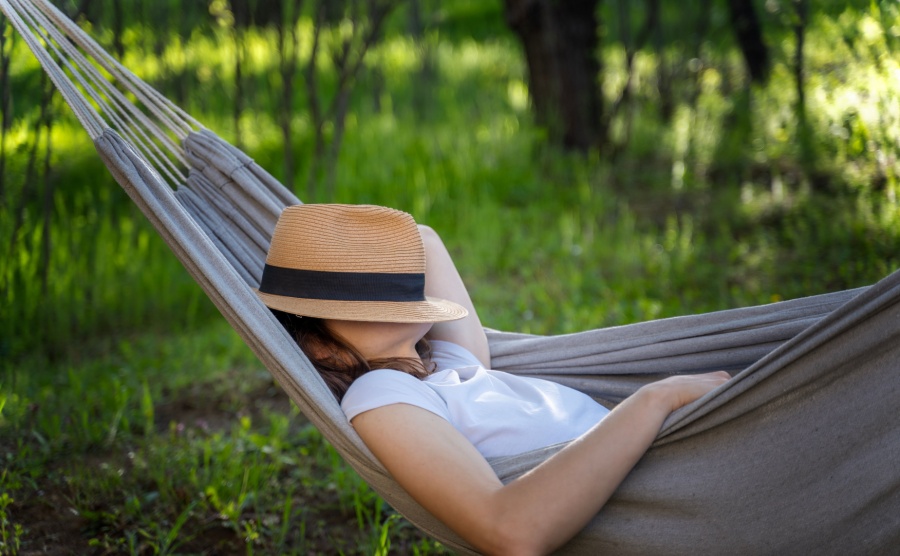Try keeping cool when the temperatures in Greece are over 32°C (89.6°F) This summer, they even went into the 40s. Keeping the house cool, without spending a fortune on air-conditioning was a real challenge. But, through experience I have learnt several ways to keep cool, which I can share with you.
Find homes in Greece via our property portal.
Cool property features
When viewing property, look out for property features designed to keep the heat out, and the cooler air in. These will save money on your bills, as well as the expense of installing them yourself.
1. Thick stone walls
We have lived in three different stone houses over the years and I can tell you the rooms don’t stay cool in a heatwave. The sun heats the stone and it radiates through. However, it does take longer to do that the thicker your walls are, so an old stone house will be cooler than a modern single walled villa. The walls of our house in the Peloponnese were a metre thick, so the heat had its work cut out getting through those.
2. Less glass
The room temperature will also depend on how much of the day the walls are in full sun and the size and amount of windows and doors. In the UK we like big windows and glass conservatories to let the sun in. But once you have lived in Greece for a summer, you’ll realise that much of the heat comes through the doors and windows. You’ll then be trying to find ways to keep the sun out.
3. Shutter up
There is a good reason why many Greek homes have shutters. By keeping them closed during daylight hours it will keep the heat out. If they are Louvre shutters they will also let some air through at night when you open the windows. This is why you want windows that open inwards, and shutters that open outward.
4. High ceilings
As heat rises, a high ceiling will allow more space for the heat to rise to. However, if you plan to use an air conditioner, a high ceiling will affect both the size of air conditioning unit needed and the time required for it to cool the room. This will dramatically increase the power consumption and electricity cost.
When using air-con, make sure you or your guests don’t leave it on all day. You can usually get away with putting it on for a few hours and then keeping the cool in the room by using the tips I have listed.
5. A courtyard
It’s great if your property has bedroom windows or doors that open onto a secure private courtyard, as you can then feel comfortable leaving them open all night. Smaller courtyards are partly shaded by the surrounding buildings or walls too.
6. A veranda
A covered veranda over your terrace will not only provide shade for your outdoor living space, it will also help keep the sun off windows and doors. A permanent structure is better than a gazebo or patio umbrellas, which don’t last long on windy days.
7. Curtains
Black out curtains on the inside will keep the sun out. In addition, if you put a curtain over the outside of doors that are in direct sunlight, it will protect the wood from the heat. We attached a mosquito net and curtain to a piece of baton and screwed it to the top of the door frame. I’d also suggest covering anything made of wood, metal or plastic, such as gates and patio furniture, as it will extend their life. We found bed sheets to be the cheapest throw overs.
8. A through breeze
Late in the evening, once the air is cooler outside than in, stand a fan in the doorway to suck the cool air in. Then open a window on the other side of the room, so that you can create a through breeze. If the air is still, you can even put a fan facing the window too, to push the hot air out.
Having a property with doors or windows on opposite sides of the room is perfect for this, and you’ll notice many old Greek houses are one room deep, and so have this feature. If the property is by the sea, you will also benefit from a refreshing sea breeze.
9. Greenery
Trees, climbers and plants around the outside of the building will help to create shade, without holding the heat in like a veranda roof does. The temperature under the canopy of a tree can be up to 20°C (68°F) lower than without. You can also create dappled shade by climbing plants such as a grape vine or bougainvillea over a pergola.
10. Turn off electrical appliances
Inside the house, if you turn off lights and unplug as many appliances as possible, it will help reduce the heat a little. Try and avoid using the cooker, especially the oven, because it really heats the room up. A property with an outdoor kitchen or barbeque is really useful on days when you don’t fancy another salad.
11. Paint colours
The walls of our house were a combination of exposed stone and white painted walls. As white reflects the light it’s the most sensible colour to paint a Greek home that gets a lot of sun. I have even seen some coloured paint fade in the sun.
Back in 1938 during a cholera outbreak, people were instructed to paint their houses with white-wash, as they believed the lime in the paint would help sanitise the home.
You will often see shutters and doors painted blue in Greece. This is a lovely cool colour and goes well with the sea and sky. However, the colour was originally chosen purely because it was what the fishermen had left after painting their boats. Blue was the cheapest colour, as it was a mixture of lime wash and a blue cleaning powder they had around the house.
12. Cool basement
If you are lucky enough to buy a property with a basement (ipóyio) I would highly recommend renovating it, so that it can be used as a summer retreat from the heat. It can be as much as 8-10 degrees centigrade cooler down there. Making it a great place for a siesta.
Keeping yourself cool
One of the joys of living in Greece is the long hot summers, you can plan to go out and be pretty sure it isn’t going to rain. However, when it gets extremely hot in the middle of the day its advisable to stay inside. Here are my top tips to keep cool.
1. Relax
You may feel confident going on long walks in your home country, but nothing prepares you for how exhausting extreme heat can make you feel. The fittest of people have run into health problem walking, cycling and swimming on a extremely hot day. Stay a short distance from other people, check you have a phone signal and take plenty of water.
You should be careful about doing any work on your house or garden in the summer. It’s better to get jobs done, such as watering plants, early in the morning. If you are considering buying a property, which has a portion you want to rent to tourists, consider what it’ll be like to have to clean and change bedding on a hot day.
2. Take a dip
A dip in a pool or the sea is a pure delight on a hot day. Therefore, if you are looking for a summer holiday home, seaside properties and those with pools are really worth the extra you’ll pay on purchase. Don’t assume you will be able to install a pool yourself. You might not be able to get permission. Therefore, check that out, before buying the property.
By keeping the water tank in the shade and shading the pool with umbrellas you can keep the water fairly cool. Outdoor showers are great too. However, we found that the sun used to heat the water in the pipe leading to the courtyard shower so we built a cover for that too.
Throughout the day it’s a good idea to regularly run water over pulse points like your wrists, neck, elbows, ankles and behind your knees. I sometimes wet a small towel or t-shirt and just lay it on me. I always have a wet flannel in a plastic bag in the fridge and a water sprayer.
3. Carry a fan
As well as the traditional hand fans, you can also buy small battery powered ones. These can be useful when waiting around in offices or at events.
4. Light clothing
Loose cotton clothing is coolest to wear in the summer. A property that isn’t overlooked by neighbours or has a private courtyard will allow you the freedom to wear as little as you like.
Avoid clothes and shoes with any metal on, like studs and zips. One summer I discovered a burnt spot on the top of each foot, and then realised that the flower attached to my sandals had a round metal stud holding it on, and it had heated up and burnt a mark on my foot.
A hat or umbrella are recommended when out in the sun. Sunglasses and suntan lotion are essential. When in the sea or pool you may feel cooler but the sun’s rays will still burn.
5. Drink water
When traveling to Greece, remember to take an insulated water bottle. Then you will be able to take it everywhere you go. Try to drink water regularly to prevent dehydration.
6. Cool shopping
In summer, I recommend taking a cool bag with cool packs in to the supermarket, otherwise, your ice-cream will start to go soft on your way home. A trip to an air conditioned shop, bank or shopping centre is a real treat in August. Especially if you can linger a while in the freezer department. Museums can also be a great place to escape the sun. The only problem is that when you walk back outside the heat really hits you, like someone pointing a hot hairdryer in your face.
7. Take a siesta
Do as the Greeks do, rest in the shade during the afternoon and then go out for a walk late in the evening. You can hear a pin drop in many villages during the afternoon.
On our first property viewing trip to Greece, we drove into one seaside town after lunch, and it was like a spell had been put on the residents. It was totally silent and we saw a couple of old men sat on chairs, in front of their shops, fast asleep. If you want to mingle with the locals it’s best to follow their daily routine. Get up early, rest in the afternoon and go out late in the evening. The locals rarely eat dinner before 9pm, and you will see families out very late at night.
The heatwave this year was certainly way too hot, but it’s only for two to three months. For me, spring and autumn are the best times of the year in Greece, because the temperature is good and you can get out and about more. If you are buying a Greek property to be used for holidays, I’d recommend planning your stays in April/May or September/October. Although, the mild winters make Greece a lovely place to visit throughout the year.
You might also be interested in:
















